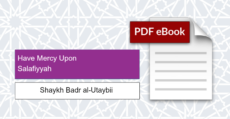In the name of Allāh, ar-Raḥmān (the most merciful), ar-Raḥīm (the bestower of mercy).
The Islamic etiquette after sneezing, and its relevant dhikr, is widely known and practiced. That is that when a person sneezes, it is recommended for him to praise Allāh by saying,
الحَمدُ للهِ
All praise is for Allāh.
Whoever heard him say that should reply,
يَرحَمُكَ اللهُ
May Allāh have mercy upon you.
The person who sneezed then replies,
يَهدِيكُمُ اللهُ ويُصلِحُ بَالَكُم
May Allāh guide you all, and rectify your affair.
There is another recommended Sunnah, which is less known and practised. When a person sneezes, he can also say:
الحَمدُ للهِ رَبِّ العَالَمِينَ
ِAll praise is for Allāh, the Lord of the worlds.
He is replied to by saying,
يَرحَمُكَ اللهُ
May Allāh have mercy upon you.
To which the person who sneezes says,
يَغفِرُ اللهُ لَنَا ولَكُم
May Allāh forgive us and you all. [1]
Shaykh Muḥammad al-Muhanna narrates from Shaykh Sultān al-Khamīs – a long time student of Imam Ibn Bāz, he said: “We had a lesson with Shaykh Ibn Bāz, reading the books of Shaykh al-Albāni; this was in the Shaykh’s house in Ḥayy Dukhnah, before he moved to his house in Ḥayy al-Badī’ah in the year 1404h. The lesson was after ‘Isha ṣalāh, two nights a week – Sunday evening reading from “al-Silsilah as-Ṣaḥīḥah” and “Irwā al-Ghalīl” every Tuesday evening. This was in the presence of a number of students of knowledge, including: Shaykh Ṣāliḥ as-Sadlān, Shaykh Ṣāliḥ Aal ash-Shaykh, Shaykh Sa’ad al-Ḥumayyid, Shaykh Sulaymān al-Mājid, Shaykh ‘Abdullāh Ibn ‘AbdulMuḥsin at-Tuwayjirī and others.
The nature of the lesson was that a student would read,and the Shaykh would commentate on some of the aḥādīth and Fiqh related issues. Sometimes he would discuss with the views and preferences of the author.”
One night, I (Shaykh Sultān) sneezed during the lessons. So I said, ”alḥamdulillāhi rabbil-’ālamīn”. The Shaykh (Ibn Bāz) replied: ”yarḥamukaAllāh”. So I said, ”Yaghfirullah lan ā wa lakum”.
The Shaykh remarked, ”This is from your own bag” meaning you have left the Sunnah and brought something from your ownself (with any evidence) i.e. when you said ”Yaghifarullāh lanā wa lakum”.
So I replied: This has been mentioned in some of the narration by Abū Dawūd and at-Tirmidhī… The Shaykh requested for the books to be brought, and began to search for this narration and we were with him. Most of the lesson was spent searching the issue. After researching and analysing the issue, it became clear to Shaykh [Ibn Bāz] that what I mentioned was in fact correct. So he remarked, “Yes, this is the Sunnah, and may Allāh reward you for this benefit.”
We then got up to have dinner with the Shaykh as was our practice whenever we used to congregate with him after ‘Ishā ṣalāh – may Allāh have mercy upon him, forgive him, and be pleased with him.”
Footnotes
[1] Narrated by Ibn Mas’ūd; Collected in an-Nasāī in as-Sunan al-Kubrā; Authenticated by Albāni.
مِنْ أخبار الشيخ ابن باز بقلم: محمَّد المهنَّا
حدّثني الشيخ سلطان الخميس (تلميذ الشيخ ابن باز) قال:
“كان لنا درسٌ مع الشيخ ابن باز لقراءة كُتُب الشيخ الألباني ، وذلك في بيت الشيخ في حيّ دخنة ، قبل أن ينتقل إلى بيته الذي في حيّ البديعة عام ١٤٠٤هـ. وكان الدرس بعد صلاة العشاء ليلتين كلّ أسبوع : مساء الأحد لقراءة السلسلة الصحيحة ، ومساء الثلاثاء لقراءة إرواء الغليل ، بحضور عدد من طلبة العلم منهم: الشيخ صالح السدلان والشيخ صالح آل الشيخ والشيخ سعد الحميّد والشيخ سليمان الماجد والشيخ عبدالله بن عبدالمحسن التويجري وغيرهم.
كانت طبيعة الدرس أن يقرأ الطالب ويُعلّق الشيخ على بعض المواضع الحديثية والفقهيّة وربّما ناقش المؤلّفَ في بعض ما قرّره وذهب إليه.
قال الشيخ سلطان : وفي ليلة من الليالي عطستُ أثناء الدرس ، فقلتُ : “الحمد لله ربّ العالمين” فقال الشيخ : “يرحمك الله” فقلت: “يغفر الله لنا ولكم”.
فقال الشيخ : “هذي من كيسك” يعني أنّك تركتَ السُنّة وأتيتَ بشيء من عندك حين قلت: “يغفر الله لنا ولكم”.
فقلت له : “جاء هذا في بعض الروايات عند أبي داود والترمذي ، وفيها أنّ العاطس إذا قال: ((الحمد لله)) فإنّه يُقال له : (يرحمك الله)) فيقول: ((يهديكم الله ويصلح بالكم)). أمّا إذا قال: ((الحمد لله ربّ العالمين)) فإنّه يُقال له: ((يرحمك الله)) فيقول: ((يغفر الله لنا ولكم)). [رواه عبدالله بن مسعود وأخرجه النسائي في الكبرى 9981# وصححه الألباني]
فما كان من الشيخ إلا أن طلب الكُتُب وبدأ يُراجع المسألة في مظانّها ونحن معه ، فذهب أكثر وقت الدرس في البحث ، فتبيّن للشيخ بعد المراجعة والنظر أن ما ذكرتُه صحيح ، فقال : “نعم هذا من السُنّة ، وجزاك الله خيراً على هذه الفائدة”.
ثمّ قُمنا لتناول العَشاء مع الشيخ كعادتنا كلّما اجتمعنا عنده بعد صلاة العِشاء، رحمه الله وغفر له ورضي عنه.



